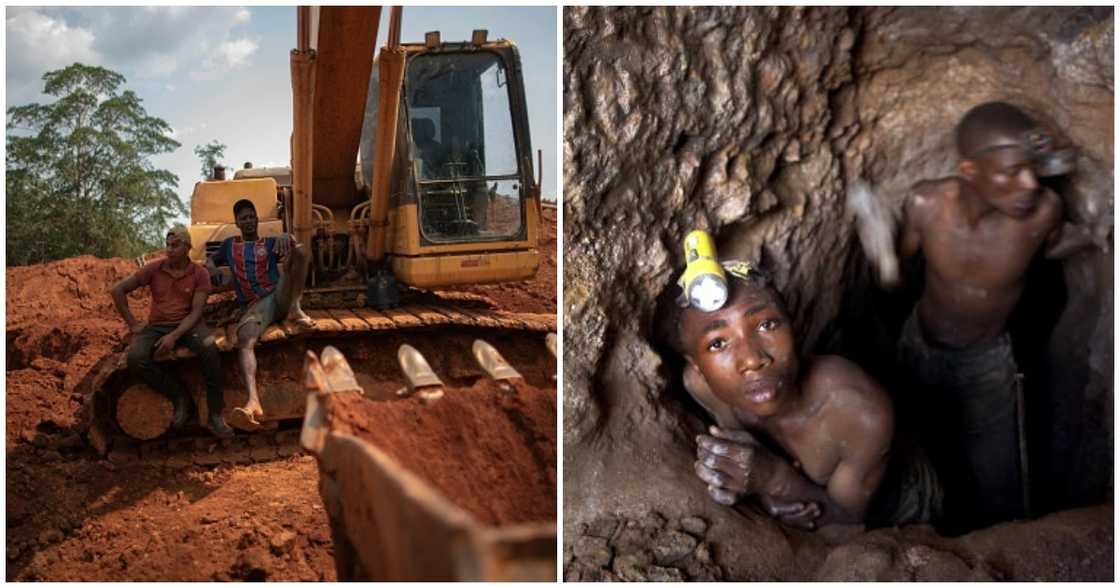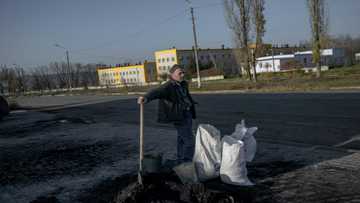Illegal Gold Miners In Ghana Dying From Irreversible Lung Damage Due To Mining Dust
- Some of the people who were once involved in artisanal mining or small-scale illegal mining are now suffering from severe lung problems due to mining dust
- Mining dusts are toxic dust from mining activities, consisting of around 40% of coarse particles
- Many victims are said to be paying huge sums of money to remain on supplementary oxygen for survival
PAY ATTENTION: Сheck out news that is picked exactly for YOU ➡️ find “Recommended for you” block on the home page and enjoy!
It has emerged that many illegal gold miners using crude means to exploit precious metals from the earth and river beds are suffering irreversible lung damage due to mining dust.
Mining dust includes the vast majority of toxic dust from mining activities, consisting of around 40% of coarse and other dangerous particles.
They are generated from natural activities such as mechanical disturbance of rock and soil materials by dragline or shovel, bulldozing, blasting, and vehicles on dirt roads.

Source: Getty Images
A new Joy News documentary has disclosed that the mining dust problem is so widespread that some illegal gold miners or people who once engaged in galamsey, are currently totally dependent on oxygen due to the irreversible damage to their lungs.
PAY ATTENTION: Enjoy reading our stories? Join YEN.com.gh's Telegram channel for more!
"Autopsy reports revealed that over 70% of lung tissues sampled from mine workers contain dust and heavy metals," the report published on Wednesday, November 16, 2022, explained.
An illegal miner and a victim of the mining dust problem identified as Kwame Asugre in the report explains how he became exposed to the extent that he now survives permanently on the oxygen supplement:
“I could pound two to four buckets full of stone repeatedly till it became like fine sand, after that we would go for another set of three or four. We would pound from early morning till late night. Sometimes it gets so dark at night that we set fires so we can continue working. We sleep briefly then immediately after day breaks we continue.
“You collect your money based on the number of buckets you are able to pound."
Kwame has been in and out of hospital many time with complaints of breathing difficulty and chest pain over the last two years.
He also appears to have lost a substantial amount of weight.
“I noticed I was not as strong as I used to be. It has gotten worse over the past two years. I cannot even take my bath or clean myself. I usually get extremely breathless and weak,” he said.

Source: UGC
Doctors say even if illegal miners halt activities for about 5 or 10 year, they are still likely to suffer the effects of mining dust, particularly a disease called silicosis.
Lack of employment and lack of agro-support and incentives from the government has compelled the youth in mineral rich parts of the country to enter into illegal mining.
Currently, illegal miners who pound the rocks and expose themselves to mining dust receive at least GH¢200 as daily wage. Although this looks lucrative, an oxygen tank requires a minimum of GH¢600 to fill and will last for about 3 days.
Illegal mining remains one of the major causes of the destruction of river bodies, lush vegetation and entire ecosystems in Ghana's hinterlands.
Galamsey Menace: Water Company Laments Increasing Production Costs – Ghana Might Import Water For Consumption
Meanwhile, YEN.com.gh has reported in a separate story that the Central Region station of the Ghana Water Company Limited (GWCL) has disclosed that the country could be forced to import water for consumption if the galamsey menace persists.
GWCL says its production cost has increased as a result of the galamsey activities at one of its treatment plants at Sekyere Heman.
Authorities said the negative effects of the menace have had a heavy toll on their operations as equipment that has a life span of 30 years has broken down and had to be replaced.
New feature: Сheck out news that is picked for YOU ➡️ find “Recommended for you” block on the home page and enjoy!
Source: YEN.com.gh




